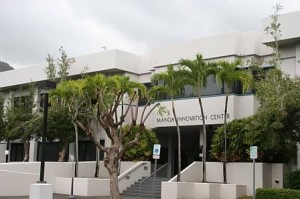An interview with Yuka Nagashima, CEO of the High Tech Development Corporation. (May, 2012)
Hi Yuka. At a high level, what is the High Tech Development Corporation, and how did it come to be?
 Governor Ariyoshi had a vision for Hawaii, and it included a bustling technology sector that enriched our community and commercial activities. The State legislature created High Technology Development Corporation (HTDC) as an attached agency to the Department of Business and Economic Development and Tourism to concentrate on this effort. The agency was designed to be governed by a governor-appointed board whose members were tapped from the private sector, sitting side by side with key government ex-officio positions.
Governor Ariyoshi had a vision for Hawaii, and it included a bustling technology sector that enriched our community and commercial activities. The State legislature created High Technology Development Corporation (HTDC) as an attached agency to the Department of Business and Economic Development and Tourism to concentrate on this effort. The agency was designed to be governed by a governor-appointed board whose members were tapped from the private sector, sitting side by side with key government ex-officio positions.
HTDC has wide authorities to take on even wider responsibilities: to cultivate Hawaii’s commercial tech and innovation sectors on 3 different levels by: 1) Assisting the Administration and the State legislature to set up sound policy to aid in this mission, 2) Setting up technology parks and incubation centers to address innovation infrastructure needs, and 3) Offering programs needed for startups and tech companies to maximize their potential for success
What is the Manoa Innovation Center?
 Manoa Innovation Center (MIC) addresses our 2nd layer of mission addressed above. It is HTDC’s flagship incubation center: qualified entities get preferred lease terms and discounted rent with amenities optimized for startup and tech companies. MIC is also HTDC’s headquarters.
Manoa Innovation Center (MIC) addresses our 2nd layer of mission addressed above. It is HTDC’s flagship incubation center: qualified entities get preferred lease terms and discounted rent with amenities optimized for startup and tech companies. MIC is also HTDC’s headquarters.
MIC also features a Virtual Incubation Program, for people who don’t need physical office space but would like to take advantage of HTDC’s educational and business assistance programs, as well as MIC’s facilities and shared equipment. It is essentially a coworking space with built in business assistance.
MIC celebrated its 20th anniversary this year, with “graduates” of the program (past tenants) which reads like who’s who in tech community today, including Henk Rogers of Blue Planet Software, and Ron Higgins of Digital Island.
The rent generated from the Center provides funds to maintain the Center and augments our State and federal funds to offer meaningful programs to Center tenants and clients beyond our facility.
If an ICS student or faculty member wanted help developing a small business, how could HTDC and the Manoa Innovation Center help?
We welcome any student or faculty members within this community to embrace their entrepreneurial nature to create a business. HTDC recommends an initial consultation meeting with qualified staff to assess or validate your needs. Depending on its outcome, we may recommend other low cost or free resources offered by our many partners, or come into the incubation program with us (or a mixture of both).
One requirement to enter HTDC’s program formally is for our committee to vet your business. The process includes an application (with business plan and financials), an interview with the HTDC incubation center staff, etc. Don’t let that scare you from speaking to us. We see ourselves as a gateway to other support systems, and we will direct you accordingly.
When you are just starting, you might not even know what your needs are, or what questions you should be posing to us (or to yourself). We can assist with that process, through our programs or with our partners, to figure our your next steps. Topics can range from what corporate structure is appropriate for you and how to secure your intellectual property, to best practices in recruitment of your team and identifying possible funding sources and appropriate grants.
People curious about being part of an entrepreneurial habitat usually come to us with a specific need in mind (e.g., “I need to raise capital”, “I need the smallest office I can rent on month-to-month basis”). It’s interesting that when they actually join us, they most appreciate the intangibles and take time to articulate the importance of being around like-minded people (facing similar challenges).
I know that HTDC has helped to start “Wetware Wednesdays”. What is that?
 WetWare Wednesday is a software developers networking event co-founded by HTDC and Blue Planet Software, because we saw the need for this industry to come together. At the policy level, unless we can identify developers, they don’t exist. Unless we can count them, it’s not deemed important. There is strength in numbers and size and we need to leverage the collective to demonstrate the benefits of developing and nurturing a software development industry in Hawaii.
WetWare Wednesday is a software developers networking event co-founded by HTDC and Blue Planet Software, because we saw the need for this industry to come together. At the policy level, unless we can identify developers, they don’t exist. Unless we can count them, it’s not deemed important. There is strength in numbers and size and we need to leverage the collective to demonstrate the benefits of developing and nurturing a software development industry in Hawaii.
Our immediate goal is to provide opportunities for software developers in academia and industry to come together to bridge any gaps that might exist, to help identify local job opportunities and match potential employees, while affecting policy, curricula, etc. to grow our software industry.
We meet monthly on a 4th Wednesday, with a topic, format and venue that varies to suit the community needs. It is free to software developers (registration is required), thanks to generous sponsors that include UH ICS! Check out http://www.facebook.com/wetwarewednesday.
From your connections in the local high tech community, what would be useful for ICS faculty and students to know?
There are numerous sources of information and support from identifying potential internships/work opportunities to how to start a business. The impression is that our tech community is small and that there are few employers out there. It’s only true if you want it to be. There are many positions that go unfilled, and websites like htdc.org, techjobshawaii.org and TechHui.com are great ways to identify these opportunities and to keep connected with what’s going on.
Remember that if you don’t like the reality you find yourself in, you can either accept it or decide to change the landscape to the extent you are able. If there’s not an opportunity being offered by someone else, create your own. If that sounds scary, find a friend with a vision, and join them! For every “Mark Zuckerberg”, there were swarms of software developers, project managers and designers and other professionals who were needed to realize the vision.
Anything else you’d like to add?
I remember my own college experience: burying myself in books, late nights in the lab. There are many things that influenced me within the campus walls, and yet the time I took to get a glimpse of the “real world” by communicating with industry folks while I was still a student provided me with perspectives I needed to put my academic work in context. I was a better student for it, and I was a better potential employee ready to contribute to society. If HTDC can assist in any way to provide that opportunity to students, faculty and any members of the entrepreneurial community, HTDC would have accomplished its larger mission at the grassroots level.
It’s a long-winded way of saying, if you want to be relevant in this community, you have to reach out to and be part of it. I am grateful to ICS faculty members who have taken the time to participate in HTDC’s and other community events to integrate some of the outreach activities into their curriculum and to support our mission.
